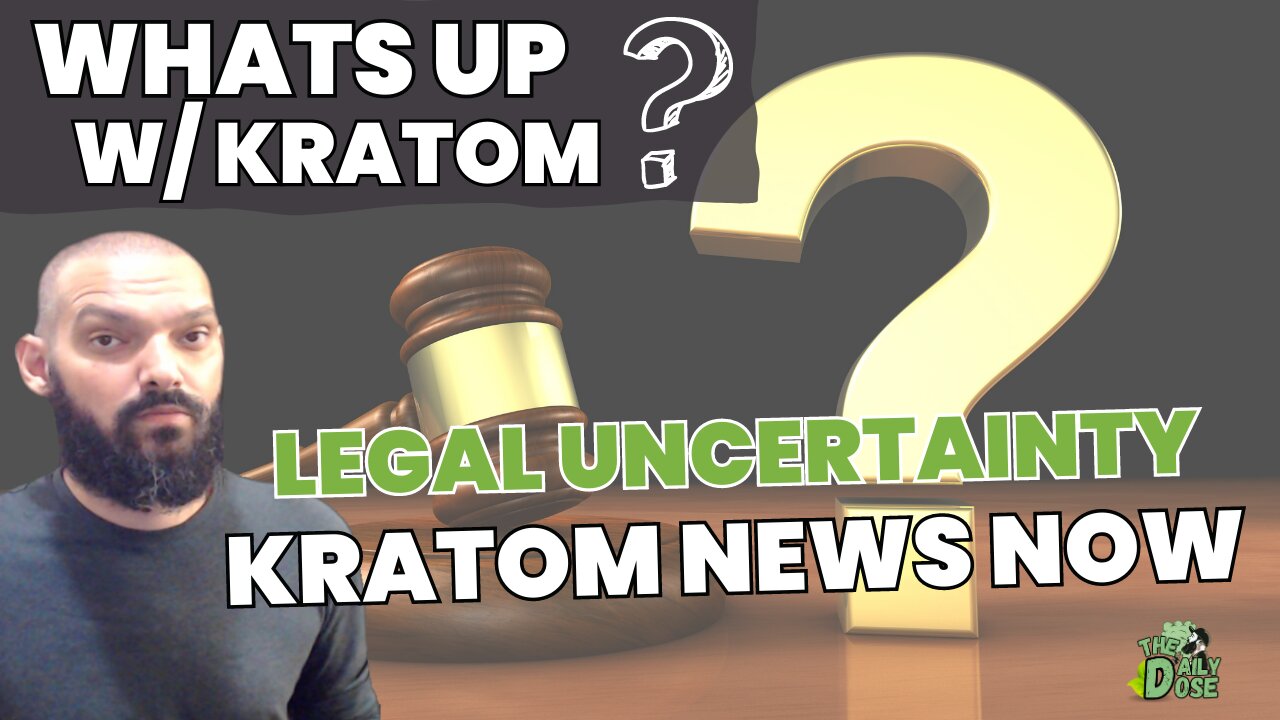Premium Only Content

Kratom Confusion And Legal Uncertainty
Today's Daily Dose is partly brought to you by
Grassdoor.com cannabis delivered fast SAVE 40% OFF Your Entire Purchase USE CODE: DAILY @ Checkout and
by Social CBD discover the power of this cannabinoid it may aid with stress, mood and sleep
https://socialcbd.pxf.io/n1GAJo
by Audible discover and enjoy a vast collection of audiobooks, stories and more save now on your first months subscription.
https://www.audibletrial.com/e462rj
If you want to help support this channel and the content please consider checking out my website TheDailyDose.co
You can also checkout these Top 5 Best Natural Health Remedies
https://5bestnaturalremedies.com/?id=6411ea08fb3fa87c9ee0f0b3
Kratom Confusion Legal Uncertainty
Kratom, a tropical tree native to Southeast Asia, has gained increasing popularity in recent years due to its purported health benefits and recreational use. However, its legal status has been a subject of great controversy, causing uncertainty among users, law enforcement, and policymakers.
1. Introduction
Kratom, scientifically known as Mitragyna speciosa, has been used for centuries in traditional medicine in Southeast Asia. Its leaves contain active compounds that can interact with the body's opioid receptors, leading to pain relief, relaxation, and a sense of euphoria. As its popularity spreads worldwide, so does the debate surrounding its legal status.
2. What is Kratom?
Kratom is a tall evergreen tree that belongs to the coffee family. The leaves of the Kratom tree are dried and ground into a fine powder or used to make extracts, capsules, or tea. The main active compounds in Kratom are mitragynine and 7-hydroxymitragynine, which can produce opioid-like effects when consumed.
The Legal Status and Kratom Confusion
The legal status of Kratom varies significantly from one country to another. Let's explore its legal standing in the United States and Europe.
Kratom in the United States: In the United States, Kratom's legal status is a complex and evolving matter.
The Drug Enforcement Administration (DEA) has previously attempted to classify Kratom as a Schedule I controlled substance, but due to public outcry and advocacy efforts, it remains legal on a federal level. However, several states and municipalities have imposed their own bans or restrictions on Kratom.
Kratom in Europe: The legal status of Kratom in Europe differs from country to country. Some nations have outright banned Kratom, while others have placed it under strict regulations. Several European countries allow Kratom for personal use, but its sale and distribution may be subject to restrictions.
Kratom Confusion And Controversial Reputation
Kratom is perceived differently by different individuals. Some users praise its potential benefits, which include pain relief, mood enhancement, and increased focus.
On the other hand, critics argue that Kratom can lead to dependence and adverse side effects.
Positive Effects: Many proponents of Kratom claim that it offers a natural alternative to conventional painkillers and can help manage chronic pain, anxiety, and depression.
Negative Effects: Opponents of Kratom point out that its misuse or overuse can lead to addiction, withdrawal symptoms, and potential health risks.
In conclusion, Kratom confusion and it's legal uncertainty reflects the complexity of its potential benefits and risks. As it gains popularity around the world, society grapples with how to address its use responsibly. Striking the right balance between regulation and access is crucial to ensure public safety while exploring the potential medical applications of this ancient herbal remedy.
#kratom #kratomnews #kratomnewsnow #kratomlegal #kratomlawsuits #kratomdeaths #kratomoverdose #NatureTherapy #AncientTraditions #MindBodyWellness #alternativehealing #herbalsupplements #healthandwellness #naturalmedicines #plantmedicines #learnaboutplantmedicines #thedailydose
-
 9:31
9:31
News And Media
1 year agoDiabetes And Mental Health The Problems Ignored
208 -
 54:47
54:47
Side Scrollers Podcast
1 day agoSide Scroller Presents KING OF THE KART | MASSIVE MARIO KART TOURNAMENT
103K6 -
 2:39:02
2:39:02
The Pascal Show
14 hours ago'HE'S THE DEVIL!' Former Mother In Law Breaks Silence On Jake Haro & Emmanuel Haro Case
1.03K1 -
 4:47:50
4:47:50
The Why Files
2 days agoCOMPILATION: UFOs and Aliens Vol.2 | They are NOT our friends
37.9K36 -
 5:30:10
5:30:10
SpartakusLIVE
8 hours ago#1 Verdansk Sniper gets HACCUSATIONS because of INSANE Headshots
45.6K4 -
 46:18
46:18
SB Mowing
2 days agoShe was LOSING HOPE but this SURPRISE CHANGED EVERYTHING
28.7K40 -
 LIVE
LIVE
ItsLancOfficial
8 hours agoWE LIVE 🔴WE LIVE 🔴 SUNDAY SUNDAYS!!!!!!! TARKOV
500 watching -
 4:09:32
4:09:32
EricJohnPizzaArtist
6 days agoAwesome Sauce PIZZA ART LIVE Ep. #59: Are You Ready for some FOOTBALL with GameOn!
25.9K7 -
 1:21:43
1:21:43
Jake Shields' Fight Back Podcast
14 hours agoJake Shields and Paul Miller!
61.1K109 -
 1:20:41
1:20:41
TRAGIKxGHOST
5 hours agoTrying to get SCARED tonight! | Are You SCARED!? | Screams Beyond Midnight | Grab a Snack
20.5K2